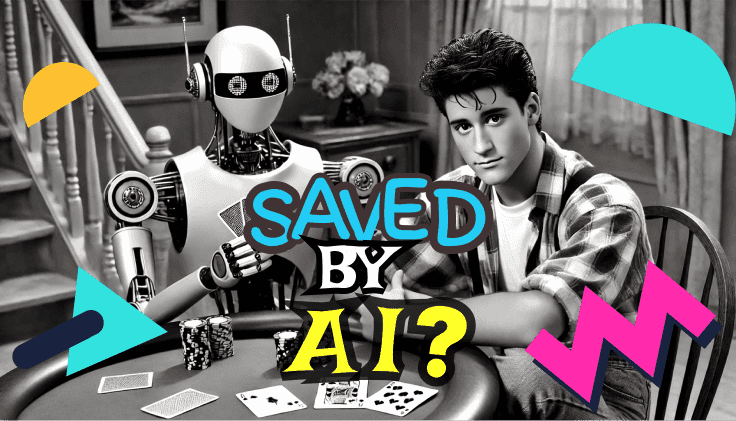1. Introduction
One morning, I'm on the train heading to a business meeting. The person sitting next to me, probably in his thirties, is typing furiously on his laptop. Without meaning to snoop, I glance over (we've all done it, right?) and realize he's using AI to draft a meeting report. Fifteen minutes later, it's all done! But is it really as impressive as it seems? Sure, AI has undeniable strengths, but does that mean you should dive right in? Before deciding, it’s important to weigh the pros and cons.
"AI wrote my report, I saved so much time!" he tells me. Really? "Well, I had to rework it and format it myself…"
2. AI: Really the Miracle Solution?
We often hear that AI can solve everything. Take the example of this report: the text generated still needed some adjustments. A good consultant can’t just copy-paste AI-generated work without adding their own expertise, analysis, and understanding of the people they're working with. A leader, on the other hand, can’t present deliverables without putting their personal touch on it.
So yes, we hear that AI can boost productivity and organize tasks… but in reality, it’s often more complicated than that.
- It's more complicated than you think: Using AI individually, for a solopreneur, sure, it can help. But implementing automation on a larger scale requires more than just adding an AI engine. Rolling it out across a company can quickly turn into a complex technical and human journey.
- Data dependency: AI runs on data. If your data is of poor quality, the results will reflect that: biased or incomplete. Managing data impeccably becomes a prerequisite, and let's face it, most companies haven't quite mastered that yet.
AI seems quick and easy, but behind the scenes, integrating it into an existing system is often much more complex. Be prepared for technical and financial challenges.
3. Ethics and Responsibility: Who's Really in Control?
AI raises major ethical questions. Are the decisions made by a machine always fair? Not necessarily.
- Algorithmic bias: AI learns from the data it's fed, but if that data is biased, the AI will just reproduce those biases. In fields like recruitment or justice, this can lead to serious consequences.
- Lack of transparency: It’s often hard to understand how an AI makes its decisions. This is known as the infamous "black box" effect. And if something goes wrong, who’s responsible?
AI can lead to big mistakes. Can we really let a machine decide for us? And more importantly, what happens when it makes a wrong decision?
4. Replacing Humans: Is It a Good Idea?
One of the major fears around AI is that it will end up replacing humans in various jobs. While this may be true in some sectors, is it really a good thing?
- AI lacks creativity and empathy: AI is great at handling repetitive tasks, but it has neither imagination nor empathy. In fields where these qualities are essential, AI will never fully replace humans.
- Varied impact on productivity: Automation can improve productivity, but we shouldn’t confuse automation with AI. Automation has been around long before AI and often gets the job done well enough.
AI can help speed up certain tasks, but it shouldn’t be seen as a universal solution.
5. Security and Cybersecurity: Is AI an Added Risk?
AI-based systems are often complex, which can introduce new vulnerabilities in terms of cybersecurity.
- Hacking risks: A poorly secured AI system is an easy target for hackers. They can manipulate the decisions made by the AI or steal sensitive data.
- Technical errors: Like any computer system, AI is not immune to errors. A small mistake in the algorithm or code can have huge consequences, especially in sectors like healthcare or transportation.
Adding AI also means adding complexity. If it's not well secured, it could end up costing your business dearly.
6. Environmental Impact: Let's Think About the Planet!
AI may seem immaterial, but it has a very real cost to the environment.
- Energy consumption: Training AI models requires enormous computing power, leading to skyrocketing energy consumption and increasing the carbon footprint.
- Heavy infrastructure: AI needs large amounts of data and processing power, which means expensive, energy-hungry infrastructure to maintain.
AI has a significant impact on the environment. If you care about your carbon footprint, it’s something worth evaluating closely.
7. Alternatives to AI: Simpler and Just as Effective!
Before jumping headfirst into AI, why not consider simpler solutions?
- No-code tools: Platforms like Penco.app allow you to create applications without coding or relying on AI. They are flexible and can meet your specific needs without requiring massive investments.
- Off-the-shelf solutions: In many cases, ready-made tools can do the job just fine.
No-code tools, for example, are easy to adopt, adaptable to your needs, and come without the complexities of AI.
8. Conclusion
In summary, while AI can be impressive in some contexts, it’s not the answer to all your problems. Between costs, ethical challenges, security risks, and environmental impact, it’s important to think carefully before diving in.
Instead of blindly following the trend, explore simpler solutions like no-code tools or existing software. These options will help you achieve your goals in a simpler, more accessible way, without the complications of AI.


